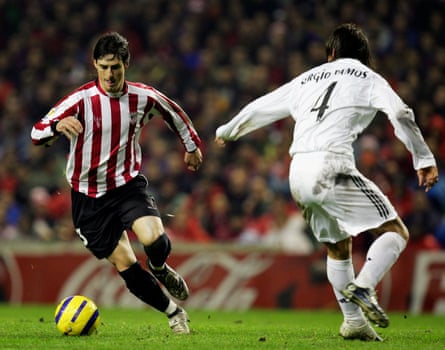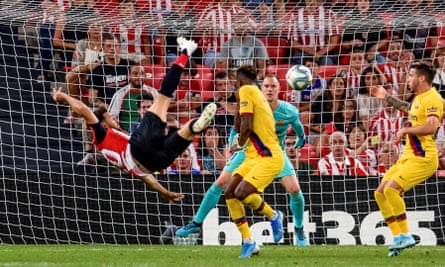[ad_1]
ven the man who turned back time eventually ran out of it, denied the perfect farewell by a hip that needs replacing and a virus that has stopped everything. There is something cruel about the way it came to a close, and in what lies before him, but when he announced his retirement on Wednesday Aritz Aduriz had a message for everyone: “Don’t worry about me.”
In the midst of a situation “far more serious, far more painful” that has caused “irreparable damage”, this doesn’t matter, he said. And yet it does, if any of it does – that recurring theme of these past two months. Not least as a symbol of the pandemic, how it reaches everything. Of football’s reach too, what it means, way beyond the medals and the money.
On Tuesday, doctors had told Aduriz he urgently needs an operation. He will have a prosthetic joint fitted – “to be able to deal with daily life as normally as possible”, as he put it. He is 39. Very old for a footballer; very, very young for a hip replacement. He had resisted retirement for a long time, getting better not worse as he got older, but he was finally due to call it a day at the end of this season whenever that is. Instead, he has to stop now, at a time when stadiums stand silent. He has played 780 games, scored 285 goals and not won a major trophy, although the 2015 Spanish Super Cup – when he scored a hat-trick against Barcelona as the club won its first title of any kind in 30 years – certainly felt like one on the streets of Bilbao.
Aduriz had one last chance, a dream that occupied him daily. Athletic Club had reached the Copa del Rey final. There, they would play against their Basque rivals Real Sociedad from Donostia, the city where Aduriz grew up. The derby is special – two clubs with a unique identity, culture and community, fans mixed together – and this was going to be the most special of all: the first time they had met in a cup final. And, after 20 years playing football, Aduriz’s last game, his goodbye. It was perfect, as if scripted. It was not to be.
“The time has come; I have said many times that football leaves you before you can leave it,” Aduriz wrote. “Sadly, my body has said: enough. I can’t help my teammates as I would like and as they deserve. That’s the life of a professional sportsman. Simple, very simple.”
Only his career has not been simple. When he was young he surfed, snowboarded, climbed mountains and skied so well that he was runner-up in the national cross-country championships, but what he really wanted was to play football. As a kid he played at the local youth club Antiguoko, alongside Andoni Iraola, Mikel Arteta and the Alonso brothers, Xabi and Mikel, joining Athletic at 19. He made his B-team debut in Spain’s third tier in 2000, and his first-team debut against Barcelona in 2002. And the rest, as they say, is history. Eighteen years on, he was still there.
Not exactly.

He played three times and then was gone: to Burgos, then Valladolid. He returned in 2006 but within two years he had left again. It wasn’t what he wanted – “It pissed me off to have to leave,” he admitted – but the choice wasn’t his, a fact often forgotten in football. It hurt to depart unwillingly and when he returned in 2012 he was determined to make up for those lost years, to rebel, to resist. To stay. Trouble is, he was 31.
“Age is just a number,” he said. And the numbers were actually improving. He arrived having scored seven league goals for Valencia the previous season and 10 the year before that. At Mallorca, he scored 12 and 11. In the two and a half seasons of his previous spell at Athletic he had scored seven, nine and six. He got six and 14 with Valladolid but that was in the second division, and 16 with Burgos in the regionalised second division B. And yet his league totals since his return read: 14, 16, 18, 20. He had played once for Spain without scoring, in 2010. In 2016 and 2017 he was recalled and played 12 times. At 35 years, 275 days he is the oldest scorer in the history of the national team. He retires having scored 66% of his first division goals over the age of 30.

“I have never seen this, ever,” said his then manager Ernesto Valverde. “Usually you think: ‘He’s 35, he has to drop at same stage,’ but you look at him and you just don’t want the league to finish ever. He’s incredible.” Vicente del Bosque described him as “an exceptional case, unique”. His current manager Gaizka Garitano called him a “competitive animal”, insisting: “Of all the players I have played with or coached, he’s the one that most has that.” At perhaps the most iconic home in Spanish football, he became the biggest icon of them all.
He did slow, it is true: next came 16 league goals, then nine. Last year, hip injury taking hold, it was only two. Athletic struggled against what would have been the first relegation in their history and he said he felt “responsible” because he had not been able to help. He considered walking away while he could still walk, but wanted to continue for one more season to leave the right way. “I couldn’t bring the curtain down like that,” he said. Instead, it was all set up to bring down the curtain like this. A Copa del Rey final, a Basque derby. It was as if he had chosen his moment, managed time once more.
And then came coronavirus. Time expanded too far even for him. The final, scheduled for April, was postponed like everything else. Only it wasn’t like everything else. Plans were made to bring back the league without fans as soon as possible but Athletic and Real Sociedad came together to announce that when it came to the cup final they preferred to wait as long as it took. Even if it had to be next year, even if they had to forfeit a potential European place. This was a match that couldn’t be played without supporters, their communities. This was a historic occasion and it was theirs; the final would mean little without them.
It was one that couldn’t be played without Aduriz either. “There’s nothing I would like more than to be able to play the final,” he said. Watching the date disappear into the distance, Athletic made plans to extend his contract, which expires on 31 July, for as long as it took to cover the final – even if it was just for him to run on for a minute at the end. Still no one knows when it will be; what they do know now is that Aduriz will not be there. “Forget dream finals, there will be time to say goodbye,” he wrote. “The time has come, the end of this journey which has been wonderful from start to finish.”
Denied the final farewell, there is at least what the cover of Marca called his final flight. On the opening night of the season with the score 0-0 against Barcelona, Aduriz came on as a late sub for Athletic, the roar at San Mamés going right through you. They cheered, loud and long, even though they didn’t really expect him to do much – there wasn’t time, but they were just happy to see him, to be able to tell him what he means to them.
And then a gift fell from the skies, time bent to his will again. “Sometimes football is so lovely that when you least expect it, that ball comes down,” Aduriz said afterwards. He shot up, sideways on, way off the ground, pausing somewhere in the air and hit the kind of acrobatic bicycle kick no one should be able to do with their first touch, let alone a 38-year-old with a hip that needs replacing. The ball flew into the net and everyone lost their heads. “I wish everyone could get the chance to experience what it’s like to score a goal at San Mamés; I can’t describe it,” he said.

It was his first touch of his final season, the first goal anyone scored in 2019-20 and already the best. His first goal and, it turned out, his last. There is none better among the 285 he has scored. This was not how he wanted to go – the cup final was, a storybook ending – but it is a hell of a way to sign off, an absurd moment with which to remember him. Even back then in the August heat it was tempting to suggest that he could have walked right there: taken off his shirt, folded it up and departed a hero, his final act one that defined him, debt paid for ever.
“I’ll miss it,” he said that night, nine months ago at the start of a season that still may never be completed and a farewell that definitely won’t, “but everything has a beginning and an end.”
[ad_2]
Source link

